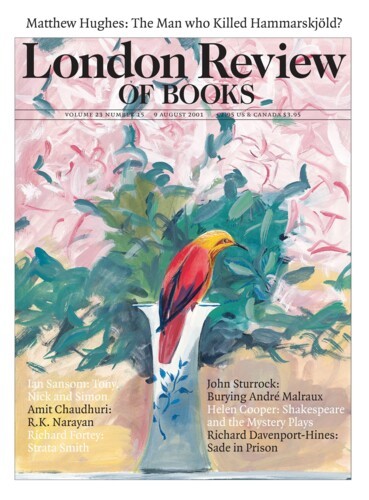Bloomsbury have sent out the first publicity pack for Kenneth Tynan’s diaries, edited by John Lahr, which are to be published in October. Among the slogans (‘Think Alan Clark meets Alan Bennett’ – no, don’t) and the paraphernalia (a padlock and key) is a pamphlet of highlights. A good many of the selected entries concern spanking, and a good many others are anecdotes about Hemingway, Dietrich, Olivier, Vivien Leigh, Miles Davis, Gregory Peck, but it’s not all like that. On 16 November 1973, Tynan read a ‘peevish and neurotic attack by John Osborne on Larry, the NT and (especially) me … He calls me a “disastrous influence” and an example of “intellectual spivvery” (a typical late Osborne phrase – vaguely venomous, unsupported by evidence)’. On 6 November 1975 he ‘learned that Harold Pinter was incensed when I said on TV a few weeks ago that the English theatre was preoccupied with the minor emotional crises of the urban middle class, and never opened its eyes to analyse society as a whole or the world outside England’. Tynan had summed up the plot of No Man’s Land as ‘a rich middle-class writer has a wary confrontation with a poor middle-class writer. Pinter’s comment was that it would be easy to write of Hamlet and Coriolanus in similarly glib sentences. But of course it wouldn’t … In both plays, whole societies are under scrutiny, not just individual temperaments.’ You couldn’t level that sort of criticism at Pinter these days; in reply he’d only have to wave the petition of the International Committee to Defend Slobodan Milosevic, on which his name appears fourth.
Although Tynan enjoyed boxing (as a spectator) and spanking, these disputes didn’t develop into physical fights. But what if they had? The LRB recently received an e-mail from a company called Yellow Dragon Self Defence, informing us that ‘in your line of work … there is a high risk of being assaulted, abducted, even killed. I have read in the papers of many such incidences.’ Perhaps they were thinking of the non-story of last year in which someone who wasn’t Philip Hensher didn’t get hit by someone who wasn’t James Thackara, after Hensher, reviewing Thackara’s first novel, said he couldn’t ‘write “Bum” on a wall’. At least Norman Mailer did head-butt Gore Vidal. Anyway, two hours with the Yellow Dragons is all it takes, and that’s offered at the knock-down price of £10 (two-thirds off): ‘It’s not worth putting yourself … at risk for that small amount of money.’ We have been warned.
Tynan merits an entry in The Penguin TV Companion by Jeff Evans (Penguin, £12.99), squeezed in between ‘TWW (Television Wales and West)’ and ‘Tyne Tees Television’, for being ‘the first person to use the “F” word on British television’; Evans, by contrast, is clearly reluctant to be the first person to say it in a TV companion. But what his guide lacks in fucks it makes up for in facts: ‘the world’s first television weather forecast,’ for instance, ‘was broadcast by the BBC on 20 November 1936 at 4.01 p.m. and lasted six minutes’; viewing figures are, sadly, not available, but they can’t have been very high. These days, as the press release says, ‘TV is no longer just something we watch.’ The day after Carlo Giuliani was shot in Genoa, the front pages of the tabloids were full, as ever, of Big Brother. However boring everything else going on outside the House might have been, you’d think the accidental death of an anarchist would have provided sufficient ‘human interest’ to distract the headlines’ attention; but no. Julia Kristeva has defended the French version, Loft Story, on the grounds that ‘in the past there was the family, the grandmother, the Church … But now these spaces of communication have vanished.’ I find it hard to think of my grandmothers as ‘spaces of communication’, but maybe that just proves Kristeva’s point.
On 19 October 1975, Tynan wrote: ‘The most powerful influence on arts in the West is the cinema.’ Movies ‘dominate the cultural subconscious because we absorb them in our formative years (as we don’t absorb books, for instance); and we see them again on TV when we grow up … As the sheer number of films piles up, their influence will increase, until we have a civilisation entirely moulded by cinematic values and behaviour patterns.’ It would be good to know what he’d have said about ‘reality’ TV.
Send Letters To:
The Editor
London Review of Books,
28 Little Russell Street
London, WC1A 2HN
letters@lrb.co.uk
Please include name, address, and a telephone number.

